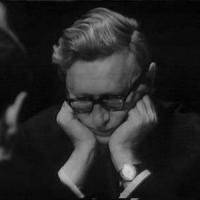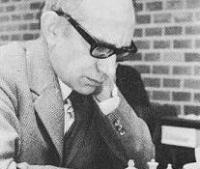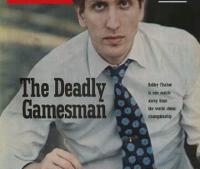
I will Play Forty Good Moves!
Early Years
Vasily Vasiliyevich Smyslov was born on March 24, 1921. He learnt chess at the age of six, and after studying books in his father's library, became really serious about the game at the age of 13, when two world champions, Capablanca and Lasker, visited his native city of Moscow.
At the age of 16 he won the All-Union boys' championship, and at 17 he shared first in the Moscow City Championship. At 19 he came third in the unrestricted USSR Championship. There followed a string of successes that caught the eye of world champion Alexander Alekhine, and he became internationally known when he beat Samuel Reshevsky twice in the famous USSR vs. USA radio match in 1945.
His motto was this “I will play 40 good moves. If you play 40 good moves, we will draw.”
The Soviet Championship
Smyslov was a frequent competitor at the Soviet Championships and enjoyed some notable successes. In 1940, while still a teenager, he finished third behind Bondarevsky and Lilienthal. At the 13th Championship in 1944, he placed second behind Botvinnik and in 1947, shared third with Bondarevsky, after Keres and Boleslavsky.
He was a joint winner of the contest in 1949 and again in 1955 (with Bronstein and Geller respectively). Whilst the 1949 title was shared, the 1955 title was awarded to Geller after a play-off.
Much later in his career he showed that he could still mount a credible challenge; he took a share of third place in 1969 (behind Petrosian and Polugaevsky) and in 1971, was joint runner-up with Tal, after Savon.
The World Championship
He was a Candidate for the World Chess Championship on eight occasions (1948, 1950, 1953, 1956, 1959, 1965, 1983, and 1985). Smyslov was one of the five players selected to compete for the 1948 World Chess Championship tournament to determine who should succeed the late Alexander Alekhine as champion. His selection was questioned in some quarters, but this criticism was amply rebutted when he finished second behind Mikhail Botvinnik.
His victory at the Zurich Candidates tournament in 1953 was one of the great feats in chess history. Though there is plenty of room for argument, it was one of the strongest tournaments of all time — and Smyslov buried the competition, losing only one game.
This qualification led to the first of three matches against Mikhail Botvinnik. The first match started catastrophically for him with Botvinnik winning games 1, 2 and 4. However a run of 4 wins and a draw starting with game 7 took Smyslov into the lead, however he then lost game 12 to see the match level at the half way stage. Shared wins in games 13 and 14 were followed by two wins for Botvinnik. Smyslov scored wins in games 20 and 23 but didn't try all that hard in the final game offering a draw on move 22 to see the match drawn 12-12. This result meant that Botvinnik retained his title. (Botvinnik is supposed to have said in response to Smyslov final game draw offer: "Your offer is so attractive I cannot refuse").
Smyslov again won the Candidates' Tournament at Amsterdam in 1956, which led to another world championship match against Botvinnik in 1957. This time, Smyslov won. The following year, Botvinnik exercised his right to a rematch, and won the title back with a final score of 12.5–10.5. Smyslov later said his health suffered during the return match, as he came down with pneumonia, but he also acknowledged that Botvinnik had prepared very thoroughly. Over the course of the three World Championship matches, Smyslov had won 18 games to Botvinnik's 17 (with 34 draws), and yet he was only champion for a year. Yet Smyslov was to write in his autobiographical games collection Smyslov's Best Games, "I have no reason to complain of my fate. I fulfilled my dream and became the seventh world champion in the history of chess."
The Chess Olympiad
He played in 9 Olympiads scoring +69 =42 -2. His total of 17 Olympiad medals won, including team and individual medals, is an all-time Olympiad record, according to olimpbase.org. Smyslov also represented the USSR in five European Team Championships, and emerged with a perfect medals' record: he won five team gold medals and five board gold medals. His total score in these events was (+19 = 15 - 1), for 75.7 per cent.
Smyslov also deserves awe and admiration for his incredible chess longevity. He was still contesting World Championship Candidates' Matches in his sixties-- the seventh World Champion had maintained his game long enough to face the thirteenth World Champion on his rise.
Music
Though Smyslov was clearly best known as a chess player, he had a great love for music. He believed that the two were interrelated. In his book, “Smyslov 125 Selected Games,” he wrote:
"My study of chess was accompanied by a strong attraction to music, and it was probably thanks to this that from childhood I became accustomed to thinking of chess as an art, and have never regarded it as anything else, for all the science and sport involved in it. And, moreover, an art which in some ways is closer to music than it is customary to think. Perhaps chess and music are drawn together by laws of harmony and beauty which are difficult to formulate and difficult to grasp, or perhaps by something else."
Theoretical Contributions
Smyslov made enormous contributions to chess opening theory in many openings, including the English Opening, Grünfeld Defense, and the Sicilian Defense. He has a variation of the Closed Ruy Lopez named for him: the line runs 1.e4 e5 2.Nf3 Nc6 3.Bb5 a6 4.Ba4 Nf6 5.0-0 Be7 6.Re1 b5 7.Bb3 d6 8.c3 0-0 9.h3 h6. Smyslov also successfully revived the Fianchetto Defense to the Ruy Lopez (1.e4 e5 2.Nf3 Nc6 3.Bb5 g6) in the 1970s. In the Slav Defense, the main line with 1.d4 d5 2.c4 c6 3.Nc3 Nf6 4.Nf3 dxc4 5.a4 Bf5 is named the Czech or Smyslov Variation.
Smyslov died in the night on Saturday March 27, 2010 in Moscow.
.






